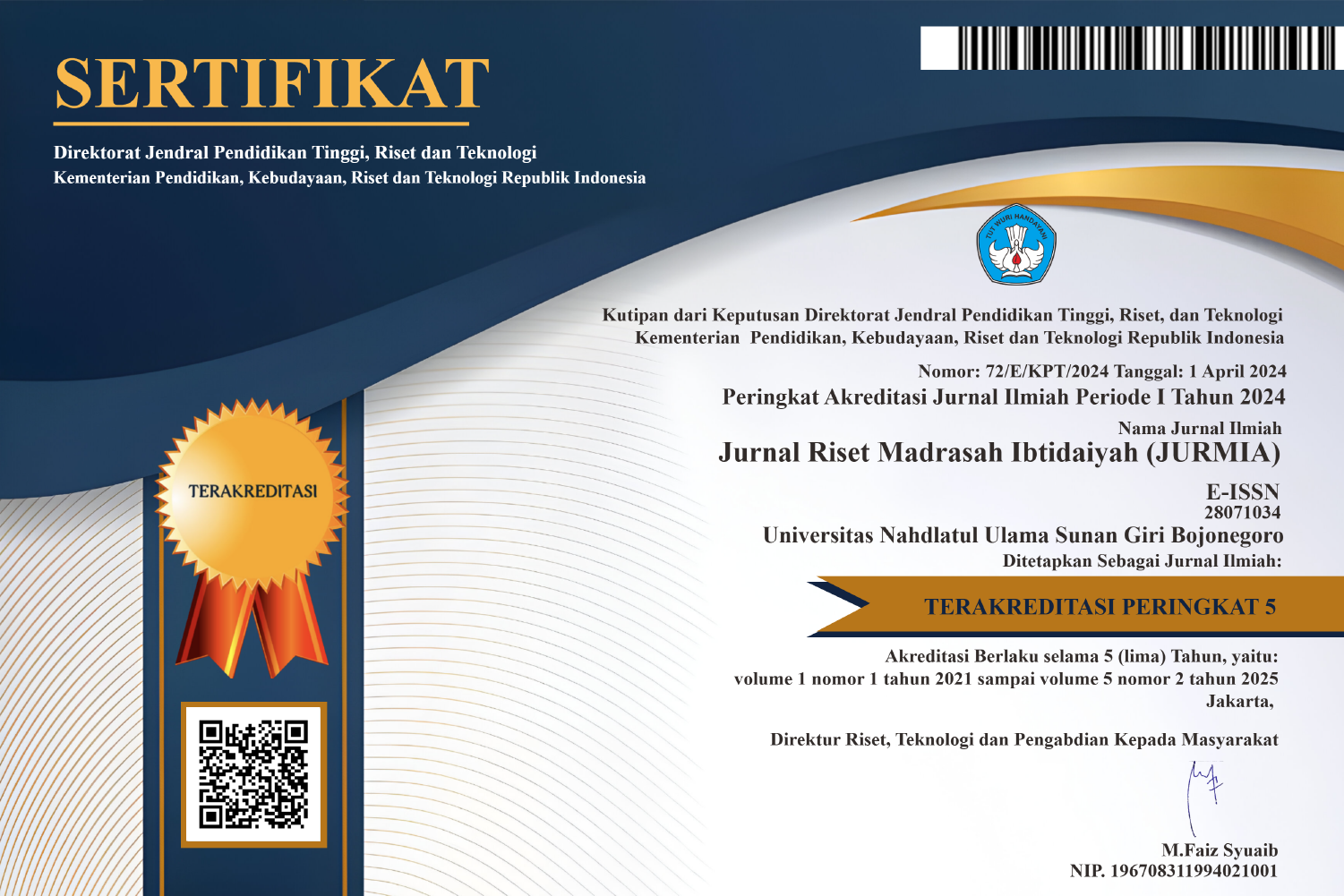Penerapan Problem Based Learning untuk Meningkatkan Keterampilan Berpikir Kritis Siswa MI Akidah Akhlak

DOI:
https://doi.org/10.32665/jurmia.v5i2.5057Keywords:
Akidah Akhlaq, Berpikir Kritis, Pembelajaran Berbasis MasalahAbstract
The lack of internalization of values in daily life is influenced by pupils' poor critical thinking abilities in comprehending the morals and religious values in depth. The purpose of this study is to evaluate how well the problem-based learning (PBL) paradigm fosters students' critical thinking abilities in the Aqidah Akhlak course. The study's background is founded on the qualitative research methodology. Tests of critical thinking abilities, observations, and interviews were used to gather data. In comparison to traditional learning, the study's findings demonstrated that the use of the PBL approach greatly enhanced students' capacity for analyzing, assessing, and resolving issues pertaining to the content of Aqidah Akhlak. Students' favorable reactions to the PBL approach, which is thought to be more engaged and contextual, support this finding. In order to develop students who are not just religious but also analytical and solution-focused, the study's conclusions highlight the significance of innovation in problem-based learning approaches in Islamic religious education.
References
Arends, R. (2015). Learning to teach. New York: McGraw-Hill International Edition.
Aziza, R. S., Irfani, D. R., Saniyah, N. M., Azzahra, T. F., Hikmah, F. A. M., Sahida, D. N., & Suttrisno, S. (2025). Problem-Based Learning Di MI. Jurnal Manajemen Pendidikan, 10(2), 641-657.
Creswell, J. W. (2015). Research design: Qualitative, quantitative, and mixed methods approaches (4th ed.). Thousand Oaks, CA: SAGE Publications.
Creswell, J. W. (2018). Research design: Qualitative, quantitative, and mixed methods approaches (5th ed.). Thousand Oaks, CA: SAGE Publications.
Facione, P. A. (2015). Critical thinking: What it is and why it counts. Insight Assessment.
Hasanah, U. (2019). Problem-Based Learning dalam Pembelajaran Akidah Akhlak: Studi di MAN 2 Jakarta. Jurnal Pendidikan Islam, 12(1), 45–60.
Hasanah, U. (2022). Best practices of PBL in madrasah. Jakarta: Islamic Education Press.
Hermawan, C. M., Rosfiani, O., Santoso, G., Aini, Z., & Elfirza. (2023). Bimtek untuk guru merancang modul ajar dan melaksanakan pembelajaran terdiferensiasi untuk capaian keterampilan abad ke-21 siswa. Jurnal Pengabdian Masyarakat Bangsa, 1(10). https://jurnalpengabdianmasyarakatbangsa.com/index.php/jpmba/article/view/534
Hermawan, C. M., Rosfiani, O., Zulfikar, & Daffa, T. M. (2022). Coaching untuk guru membuat modul ajar dan melaksanakan pembelajaran proyek untuk meningkatkan keterampilan abad ke-21 dan keterampilan literasi murid. Kawanad: Jurnal Pengabdian kepada Masyarakat, 1(2). https://journal.kawanad.com/index.php/kjpkm/article/view/87
Hussein, M. (2020). The effectiveness of problem-based learning in Islamic education. International Journal of Instruction, 13(3), 425–442.
Kementerian Pendidikan dan Kebudayaan. (2018). Panduan implementasi pembelajaran abad 21. Jakarta: Kemdikbud.
Merriam, S. B. (2016). Qualitative research: A guide to design and implementation (4th ed.). San Francisco, CA: Jossey-Bass.
Nurdin, E. (2020). Pembelajaran Akidah Akhlak di era digital: Tantangan dan solusi. Jurnal Pendidikan Islam, 8(1), 45–60.
Nurdin, E. (2022). Model pembelajaran Akidah Akhlak berbasis kontekstual. Jakarta: Kencana.
Patton, M. Q. (2015). Qualitative research & evaluation methods (4th ed.). Thousand Oaks, CA: SAGE Publications.
Rahman, A. (2021). Berpikir kritis dalam pendidikan agama Islam. Islamic Education Journal, 6(1), 45–63.
Rahman, A. (2021). Inovasi pembelajaran Akidah Akhlak dengan pendekatan PBL. Islamic Education Journal, 5(2), 112–130.
Rosfiani, O., Hermawan, C. M., & Sutisnawati, A. (2022). Developing 21st century skills and literacy skills for elementary school students through constructivist-based planning and assessment of critical engagement models. In Proceedings of The Sixth International Conference on Language, Literature, Culture, and Education (The 6th ICOLLITE) (pp. 414–421). https://www.atlantis-press.com/proceedings/icollite-22/125982940
Rosfiani, O., Nuraini, A., Fauziah, I. N., Ubaidillah, M. A., Zahroh, S. F. T., Zahro, & Faturrahman, R. (2025). Efektivitas model pembelajaran problem based learning dalam meningkatkan hasil belajar PKN materi musyawarah siswa kelas II di SDS An-Nuriyah. JPK (Jurnal Pancasila dan Kewarganegaraan, 10(1). http://journal.umpo.ac.id/index.php/JPK/article/view/10826
Rosfiani, O., Nuraini, A., Fauziah, I. N., Ubaidillah, M. A., Zahroh, S. F. T., Zahro, & Faturrahman, R. (2025). Penelitian tindakan kelas: Problem based learning dapat meningkatkan hasil belajar PKn materi musyawarah siswa kelas II di SDS Annuriyah. Indonesian Research Journal on Education, 5(1). https://www.irje.org/irje/article/view/1684
Rosfiani, O., Syafitri, F. S., Alamsyah, N. A. P., Suparjo, K. F., & Ramadhan, A. (2025). Pengaruh model pembelajaran project based learning terhadap hasil belajar IPA siswa kelas V Madrasah Ibtidaiyah Al-Munawwaroh Kota Tanggerang. Innovative: Journal of Social Science Research, 5(1). https://j-innovative.org/index.php/Innovative/article/view/17983
Rosfiani, O., Wahyuni, S., Irawan, M. D., Nurdianto, W., & Guna, A. P. M. (2024). Problem-based learning in civics education (PKN): A classroom action research in Indonesia. EDUTREND: Journal of Emerging Issues and Trends in Education, 1(3). https://rcsdevelopment.org/index.php/edutrend/article/view/303
Rosfiani, O., Wardoyo, V. A., Fajriani, N., Putri, Z., & Heryana, R. M. (2025). Upaya meningkatkan kemampuan pemecahan masalah matematika menggunakan model problem solving di MI Nurul Falah. Pedagogi: Jurnal Ilmiah Pendidikan, 11(1). https://siakad.univamedan.ac.id/ojs/index.php/pedagogi/article/view/936
Savery, J. R. (2015). Problem-based learning: An instructional model and its constructivist framework. Educational Technology, 35(5), 31–38.
Savery, J. R. (2019). Overview of problem-based learning: Definitions and distinctions. Interdisciplinary Journal of Problem-Based Learning, 13(1).
Suryani, N. (2020). Model pembelajaran inovatif dalam pendidikan agama Islam. Bandung: Remaja Rosdakarya.
Sutisnawati, A., Rosfiani, O., Hermawan, C. M., Fahrezi, M. I., Azie, I., Wahyuni, S., Mardiyah, A., & Kamila, A. (2022). Penerapan model pembelajaran konstruktivis berbasis proyek untuk meningkatkan keterampilan literasi siswa kelas V sekolah dasar. Jurnal Cakrawala Pendas (JCP), 8(4). https://ejournal.unma.ac.id/index.php/cp/article/view/3326
Wahyudi, D. (2022). Tantangan pembelajaran aktif di era digital. Jurnal Edukasi Islam, 7(1), 78–95.
Yasir Rizqa, M. Danil, Nadia Aldyza. (2021). Implementasi problem-based learning dalam pembelajaran pendidikan agama Islam di Madrasah Ibtidaiyah. JURMIA: Jurnal Madrasah Ibtidaiyah, 5(2), 45–60.
Zubaidah, S. (2020). Pembelajaran Akidah Akhlak berbasis masalah. Malang: Universitas Negeri Malang Press.
Zulkifli, M., & Ismail, N. (2021). Critical thinking in Islamic studies. Journal of Muslim Education, 15(2), 78–95.
Downloads
Published
Issue
Section
License
Copyright (c) 2025 Okta Rosfiani, Ratih Salsabila Salsabila, Najwa Putri Khaerani, Muhammad Rafly Nur Rachman , Muhammad Ariel

This work is licensed under a Creative Commons Attribution 4.0 International License.
 PDF (Bahasa Indonesia) Download: 237
PDF (Bahasa Indonesia) Download: 237










